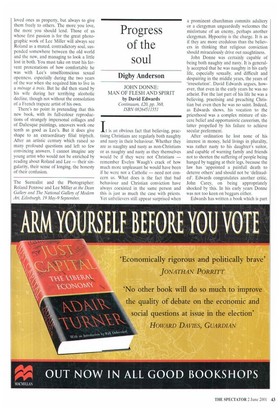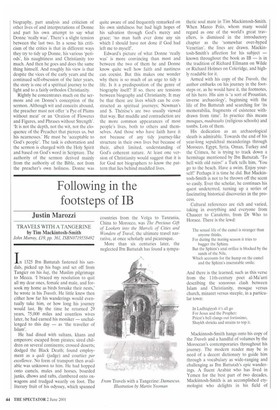Progress of the soul
Digby Anderson
JOHN DONNE: MAN OF FLESH AND SPIRIT by David Edwards Continuum, £20, pp. 368. ISBN 08264511551 It is an obvious fact that believing, practising Christians are regularly both naughty and nasty in their behaviour. Whether they are as naughty and nasty as non-Christians or as naughty and nasty as they themselves would be if they were not Christians — remember Evelyn Waugh's crack of how much more unpleasant he would have been if he were not a Catholic — need not concern us. What does is the fact that bad behaviour and Christian conviction have always coexisted in the same person and this is just as much the case with priests. Yet unbelievers still appear surprised when a prominent churchman commits adultery or a clergyman unguardedly welcomes the misfortune of an enemy, perhaps another clergyman. Hypocrisy is the charge. It is as if they are more credulous than the believers in thinking that religious conviction should miraculously drive out naughtiness.
John Donne was certainly capable of being both naughty and nasty. It is generally accepted that he was naughty in his early life, especially sexually, and difficult and despairing in the middle years, the years of 'irresolution'. David Edwards argues, however, that even in the early years he was no atheist. For the last part of his life he was a believing, practising and preaching Christian but even then he was no saint. Indeed, as Edwards shows, his vocation to the priesthood was a complex mixture of sincere belief and opportunistic careerism, the latter propelled by his failure to achieve secular preferment.
After ordination he lost none of his interest in money, held livings in plurality, was rather nasty to his daughter's suitor, and capable of warning family and friends not to shorten the suffering of people being hanged by tugging at their legs, because the law has 'appointed a painfull death to deterre others' and should not be 'defrauded'. Edwards congratulates another critic, John Carey, on being appropriately shocked by this. In his early years Donne was not too keen on beggars either.
Edwards has written a book which is part biography, part analysis and criticism of other lives of and interpretations of Donne and part his own attempt to say what Donne 'really was'. There's a slight tension between the last two. In a sense his criticism of the critics is that in different ways they try to tidy up Donne, his various 'periods', his naughtiness and Christianity too much. And then he goes and does the same thing himself. And roughly his view is that despite the vices of the early years and the continued self-obsession of the later years, the story is one of a spiritual journey to the light and to a fairly orthodox Christianity.
Rightly he concentrates much on the sermons and on Donne's conception of the sermon, Although wit and conceits abound, the preacher must not offer 'a Pye of Plums without meat' or an 'Oration of Floweres and Figures, and Phrases without Strength'. 'It is not the depth, not the wit, not the eloquence of the Preacher that pierces us, but his nearnesses.' He must be 'acceptable to God's people'. The task is exhortation and the sermon is charged with the Holy Spirit and based on God's word in Scripture. The authority of the sermon derived mainly from the authority of the Bible, not from the preacher's own holiness. Donne was quite aware of and frequently remarked on his own sinfulness but had high hopes of his salvation through God's mercy and grace; `no man hath ever done any sin which I should have not done if God had left me to myself'.
Edward's picture of what Donne 'really was' is more convincing than most and between the two of them he and Donne know quite well how faith and nastiness can coexist. But this makes one wonder why there is so much of an urge to tidy a life. Is it a predisposition of the genre of biography itself? If so, there are tensions between biography and Christianity. It may be that there are lives which can be constructed as spiritual journeys; Newman's and S. Therese's are two usually viewed that way. But muddle and contradiction are the more common appearances of most people's lives, both to others and themselves. And those who have faith have it not because of any tidy journey-like structure in their own lives but because of their, albeit limited, understanding of God's coherent nature. At least one version of Christianity would suggest that it is for God not biographers to know the pattern that lies behind muddled lives.











































































 Previous page
Previous page